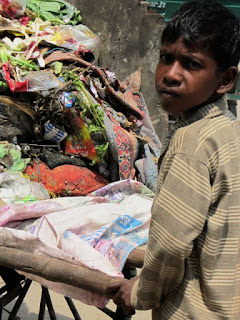 The recent success of the F1 tamasha proved once again the terrible and growing divide between the rich and the poor in our country, a divide growing by the minute. A thought provoking essay in a leading magazine poses the question that we all need to ask ourselves: Is India doing marvellously well, or is it failing terribly?
The recent success of the F1 tamasha proved once again the terrible and growing divide between the rich and the poor in our country, a divide growing by the minute. A thought provoking essay in a leading magazine poses the question that we all need to ask ourselves: Is India doing marvellously well, or is it failing terribly?
One does not have to be a rocket scientist to realise that India may look well to some but is in a abysmal situation for a vast majority. The incisive article throws some disturbing statistics. Believe it or not Bangladesh has overtaken India in terms of a wide range of basic social indicators: life expectancy, child survival, fertility rates, immunisation rates, and even some (not all) schooling indicators such as estimated “mean years of schooling”. Not something to be proud of. And that is not all. We in India have the highest proportion of underweight children in the world! Something that should make us hand our head in shame particularly when one thinks of the food fiestas we see on the other side of the fence be it at nuptials or holy festivities. And what about the enormous quantities of nourishment that finds its way into the garbage of many.
One again does not have to be a rocket scientist to see that at one of the spectrum India is going richer by the second: glitzy malls, seven star hotels, opulent homes, luxury hospitals, fancy schools are some of the visible indicators of this fact. Yet at the other end of the same spectrum schools are pathetic and health care practically non Growth growth can be very helpful in achieving development, but this requires active public policies to ensure that the fruits of economic growth are widely shared, and also requires—and this is very important—making good use of the public revenue generated by fast economic growth for social services, especially for public health care and public education. So if all had gone well the growth that is so blatant should have entailed significant development. But here once again our rulers have failed us completely. What we seem to be witnessing is the opposite. As the rich get better schools, schools for the poor get worse and worse. As the rich get swankier hospitals the poor are left with quacks and overcrowded ones. And so on.
Growth that should in an ideal situation have promised marked improvement in social indicators seems to have done nothing of the sort. Quite the contrary. The article cites how biscuit manufacturers attempted to hijack the government’s midday meal programme and though they have not managed to get what they sought, they are still at it and despite much vigilance and resistance from activist quarters (and the Supreme Court), they seem to have made significant inroads into child feeding programmes in several states. The share of the pie is too tempting to let go.
Why has there been such a massive neglect of the interests of the poor is the question that needs to be asked. The authors offer some insight: could it be a reflection of the good old inequalities of class, caste and gender that have been around for a long time though it does seem that these are diminishing. Or could it be the growing influence of corporate interests on public policy and democratic institutions does not particularly facilitate the reorientation of policy priorities towards the needs of the unprivileged. A good example would be the growing medical insurance business and the private hospitals nexus. I guess it is both. But I also think that there is another cause for neglect of the poor and this is first hand knowledge. It seems that greed and money power have leached us of all compassion and sensitivity and turned one slice of Indians into heartless and unconcerned souls. We encounter aberrations every day and turn our face away. It could be a child begging, a child working and we simply turn our face away. But will the fragile castles we have surreptitiously build stand the test of time. I wonder.
The authors conclude by saying; There is probably no other example in the history of world development of an economy growing so fast for so long with such limited results in terms of broad-based social progress…. Food for thought.




